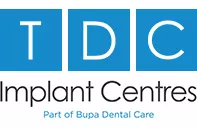We aim to provide you with information that helps you make the best treatment decisions. In this section, we provide useful articles to answer the questions we are often asked, and tell you more about the award-winning TDC team.
Can I get implants with gum disease?

“You can have dental implants if you have gum disease” says TDC Implant Centres Lead Surgeon, Dr Michael Zybutz.
“Unfortunately, many of our patients have been incorrectly told gum disease or bone loss makes them unsuitable for dental implant surgery.
So they suffer unnecessarily with missing and loose teeth, or uncomfortable dentures.
They live with constant dental pain, unable to eat certain foods for fear of further loosening or tooth loss and, sadly, too self-conscious to smile.
They come to us as a last hope, asking: ”I have gum disease, can I have implants?”
When Anthony (Dr Anthony Zybutz, Lead Dentist) and I tell them we can safely restore full sets of fixed teeth on implants, restoring their smiles and self-confidence in a matter of hours, it’s a huge relief for them.”
What is gum disease?
Gum disease develops when the soft gum tissue and bone surrounding your teeth become infected. Gingivitis is the early form of gum disease, occurring when there’s a build-up of plaque (deposits of bacteria) on the teeth.
If untreated, the plaque can spread beneath the gum line and develop into a more advanced gum disease called periodontitis or periodontal disease.
What causes gum disease?
The leading cause of gum disease is plaque build-up, usually caused by an inadequate oral hygiene routine.
Smoking is another known cause, and hereditary illnesses can be a factor.
It’s estimated that 90% of the UK population have some level of gum disease*, with many unaware they have it in the early stages.
According to the American Academy of Periodontology (AAP); “Gum disease is often silent, meaning symptoms may not appear until the advanced stages.”
Can you prevent gum disease?
“People don’t realise the consequences of poor oral hygiene and not caring properly for their teeth” says Dr Michael.
“Just two minutes of brushing teeth twice a day using a fluoride toothpaste keeps your mouth healthy, reducing your chances of developing gum disease. It can save years of pain, worry and a lot of expense.
Flossing as part of your daily oral hygiene routine is highly recommended to ensure all parts of the teeth are properly cleaned.
Dental floss and interdental brushes can reach the small spaces between your teeth and around the gum line.”
How is gum disease treated?
How you treat gum disease varies by patient.
It’s important to have regular check-ups with a dental professional as they can catch any issues and advise on the best gum disease treatments for you.
Gingivitis is usually reversible with a good at-home oral hygiene routine (diabetes and pregnancy can affect how well the body can reverse the effects of gum disease); your dentist or hygienist can offer advice regarding flossing and brushing.
People more severely affected with periodontal disease, may require antibiotics or surgical solutions such as dental implants.
However bad you think the condition of your gums may be, don’t put off seeking help. Your dentist can advise the best treatment options.
Why is gum disease serious?
In the early stages of gum disease (gingivitis), key symptoms are bleeding gums when brushed, and the gum tissue becoming swollen and sore.
Additional symptoms include bad breath and an unpleasant taste in the mouth.
Left untreated, gum disease can advance to periodontitis (periodontal disease) which is more serious as the gums shrink and jawbone density can become reduced.
Eventually the receding gums and bone can no longer support your teeth, so they become loose and can even result in tooth loss.
And there are wider implications for your health: “Periodontal disease can be linked to stroke, heart disease, diabetes and other chronic illnesses,” say the AAP.
Can you get dental implants if you have gum disease?
At TDC we use an advanced, highly skilled technique called Smile in a Day, where dental implants and a first full set of fixed teeth are placed on the same day.
The treatment is suitable even for people with severe gum disease.
When performed by a suitably experienced dental surgeon, the procedure solves all the problems associated with gum disease, loose and missing teeth.
As well as new teeth that look and function like natural teeth, gum infection is eliminated, and oral health restored.
Can I have dental implants if I have bone loss?
Yes, TDC Smile in a Day is suitable for replacing lost teeth for patients with extreme bone loss.
The implants, (usually four per jaw – the technique is sometimes referred to as “All on Four”), are placed at very precise angles, making use of the maximum amount of available jawbone, even if there’s loss of bone density. In most cases bone graft surgery is not needed.
Occasionally patients have specific medical or dental needs that require additional treatment such as zygomatic (cheekbone) implants.
Even with zygomatic implants, the procedure can be carried out on the same day.
How is Smile in a Day different from traditional implant treatments?
With traditional dental implants, treatment involves more stages, often requiring additional surgical procedures such as tooth extractions and bone grafts, and many more months of healing time.
Smile in a Day is an advanced, less invasive implant placement technique, condensing multiple steps into much-reduced overall treatment time.
We extract any necessary teeth, place the dental implants (they replace your natural tooth roots) and fixed new teeth on the same day.
Patients arrive with loose and missing teeth and leave with full sets of teeth securely fixed on dental implants, beautiful new smiles and renewed confidence.
Your new teeth remain in place for about three months, night and day, to allow the bone to integrate with the implants and for your gums to settle. There is no need to wear a removable denture during this healing period.
The first set of teeth is then exchanged for the final, long-lasting set, crafted to give you the perfect fit.
Can any dentist perform Smile in a Day?
Whilst any qualified dentist registered with the General Dental Council can legally place dental implants, it is important to find a dentist with the skill and experience to safely deliver the clinical and aesthetic results you hope for.
All surgical procedures carry some risk, so it’s especially important when considering advanced, more complex, dental treatments such as same-day dental implants.
TDC Implant Centres have focused on dental implant treatment, specifically Smile in a Day same-day dental implants, since 2010.
The majority of our patients require at least one full jaw of teeth restored on implants (often both).
Under the clinical care of Drs Michael and Anthony and their teams, we routinely help the most complex cases.
Specialist periodontal care
The AAP describe a periodontist as “a dentist who specializes in the prevention, diagnosis, and treatment of periodontal disease … and in the placement of dental implants.”
Dr Michael is a UK-registered specialist periodontist with over 25 years’ experience.
To qualify as a specialist, dentists must be registered with the General Dental Council (GDC) and demonstrate proven additional training, qualifications and experience in their specialist field.
As Dr Michael specialises in the area of dentistry concerning the gums, jawbone and dental implant placement, our patients are often referred to us by general dentists, as well as patients who refer themselves.
Gum disease and bone loss are not barriers to dental implant treatment
“So many people come to us believing their gum disease and jawbone loss means they’re destined for a lifetime of dental pain, uncomfortable dentures and avoiding certain foods – and struggling with self-confidence as they’re embarrassed to show their smile,” says Dr Anthony.
“We founded TDC Implant Centres specifically to help these people.
We know Smile in a Day implants offer a life-changing solution.
Whatever the reasons for your problems, we’ll help find the right tooth replacement options for you.
Just take the first step – come and see us. We will never make you feel judged.”
Risks factors for dental implants
Dental implants are a proven and long-lasting fixed solution to loose and missing teeth, and dentures, and at TDC we are very proud of our consistently outstanding results and success rates.
It should be noted that all implant treatment carries a risk of failure and gum disease can be a risk factor. The key risk factors are as follows:
· Gum disease (especially untreated): Please note that gum disease is completely treated when all teeth are extracted before the implants are placed.
At TDC, we highly recommend attending regular hygiene appointments after treatment is completed so any issues can be identified before any potential issues become serious.
· Poor oral hygiene: Well cared for dental implants can last a lifetime, just like natural teeth.
Once the dental implant treatment is complete, it is the responsibility of the patient to look after their new teeth on implants – a good and regular at-home dental hygiene routine is vital.
At TDC we provide you with all the information you need to ensure you can keep your new teeth in the best possible condition.
· Smoking: smoking is not a barrier to having dental implants, but studies have shown that overall success rates are lower than with non-smokers.
However, nicotine constricts your blood vessels, depriving the tissue in your mouth of oxygen and nutrients, and also reduces saliva flow, all of which slow down the healing process.
Smoking also lowers your immunity and ability to fight infection.
· Diabetes (uncontrolled): Uncontrolled diabetes can reduce implant success rates as patients are more susceptible to infections, thereby affecting healing time and the ability to heal well.
The risk of dental implant failure is lowered when the diabetes is controlled.
Book your free consultation
If you worry about loosening teeth, tooth loss or gum recession, and would like to understand if you could be a suitable candidate for dental implants after gum disease, we offer a free initial consultation with one of our experienced implant dentists.
Simply request your free consultation or call 0800 012 2086 to speak with one of our friendly Patient Advisors.
